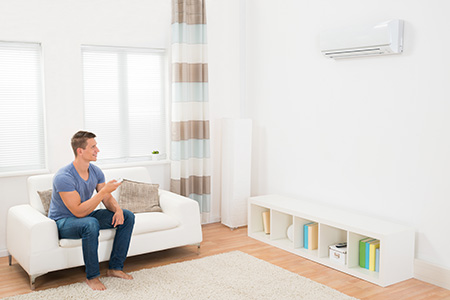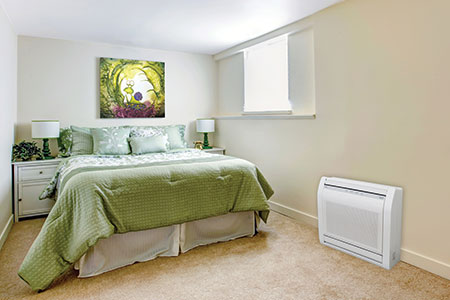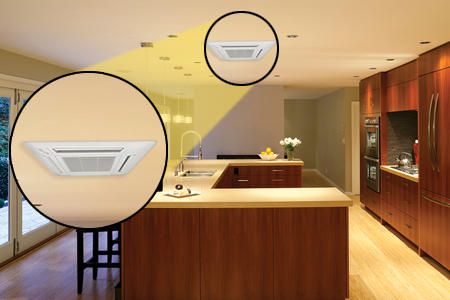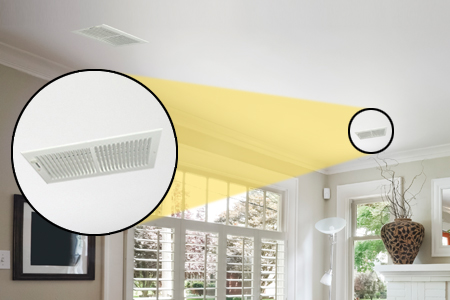Heat Pumps
Heat pumps are becoming a popular heating and cooling system across the U.S., including in cold climates, because they offer highly efficient heating, cooling, and air purification capabilities. The Truckee Donner Public Utilities District offers up to $4000 in rebates for heat pumps. For contractors, the TECH Clean California incentive offers $1000 per outdoor heat pump unit, which can be passed along to the customer. Click here to find a contractor near you.
How do heat pumps work?
An electric heat pump is an all-in-one heating and cooling unit, essentially an air-conditioner that runs in two directions. In the summer, it functions like a traditional A.C. unit, pumping heat out of the home and circulating cooled air inside. In the winter, it draws heat into the home.
This makes heat pumps much more efficient than gas furnaces. Furnaces create heat by burning fuel. This means that in theory, for every one unit of energy input, they can only produce one unit of energy output. In reality, even the most efficient gas-powered furnaces are only 80 or 90 percent efficient.
By contrast, heat pumps transfer heat rather than generate it. This allows them to reach efficiencies over 300 percent in some cases. Though heat pump efficiency declines as outdoor temperatures drop, they can still operate more efficiently than a furnace. At below zero temperatures, they may operate twice as efficiently as a furnace instead of four times as efficiently. Heat pumps are able to provide efficient heating in cold climates even at outdoor temperatures as low as -15F. Check out this article about heat pumps in cold climates.
There are four types of indoor units:

- Wall Units

2) Floor Units

3) Ceiling cassettes

4) Ducted
What are the benefits?
- Air quality – Heat pumps purify indoor air all year, filtering out viruses and pollutants like wildfire smoke
- Low-cost heat – Heat pumps are one of the lowest cost sources of heat
- Low-cost air conditioning – Today’s heat pumps are twice as efficient as typical air conditioners
- Room-by-room control – When installed with multiple indoor units, heat pumps allow for room by room temperature control.
- Safety – since heat pumps are electrically powered, there is no risk of combustion gas leaks
What are other considerations?
- Supply chain delays – Though it is most cost-effective to install a heat pump at time of furnace replacement, you will not want to wait until your old furnace is already broken. Due to supply chain delays and busy contractor schedules, it is best to think ahead and plan your installation prior to furnace failure.
- Power outages – Heat pumps run off of electricity, so they will not work when the power goes out. However, most gas furnaces require electricity to operate as well, so backup power (such as batteries, woodstoves, gas or propane stoves or generators) are recommended whether you have a gas furnace or an electric heating system.
- Cold temperature performance – Because heat pumps extract heat from outside to provide warm air inside during the heating season, as it gets colder outside, the heat pumps work harder to keep up, making them less efficient. For example, a system that delivers four units of heat for every unit of electricity (400% efficiency) at 50°F may deliver only two units of heat for every unit of electricity (200% efficiency) at temperatures below zero. There is evidence of the highest performance cold climate units operating and providing heat even below -15 °F. But if the temperature drops low enough, the system may turn off completely. Be sure to check out the minimum operating temperature listed for your heat pump. If you experience prolonged periods below that temperature, consider a secondary backup heating system to maintain your desired comfort level through the chilliest nights. If you use a backup system, just be sure to switch back to your heat pump once temperatures rise, or you could quickly lose your energy savings.
- Interactions with primary heating system – If you are thinking about using a heat pump along with another heating system, make sure to locate the heat pump where it won’t conflict with the other system’s thermostat. This could result in one system preventing the other from running. This is not a risk if you are using a heat pump as your only heating system.
Image and information source: Efficiency Maine